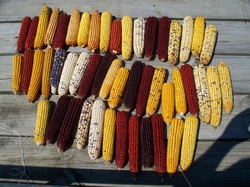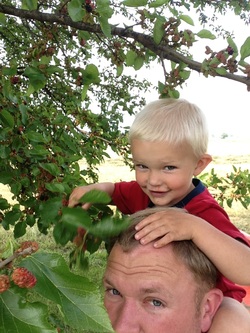God Bless!
Farmer Brent
P.S. We are always open to hear your thoughts and opinions so please don't be shy and give us a call!
|
No, we are not out of business. Yes, it is true, I have not updated this blog in about two years. I am not much for writing and I'm lucky to get back to your emails within a weeks time, its just that farm life is BUSY! Writing is certainly not second nature to me or my wife so its usually the last thing that gets done. The only real reason for this blog post is to let everyone know that our farm is alive, doing well, and growing! I was recently informed that a few people were not sure if we were in business due to the lack of updates on our page and blog. Please feel free to follow us on Facebook or call with any questions. We do operate year round and sell individual cuts and have Package "kits" available for those that want a nice sampler box to try, just email us through the contact page or give us a call and we'll do our best to help you out.
God Bless! Farmer Brent P.S. We are always open to hear your thoughts and opinions so please don't be shy and give us a call!
1 Comment
So last night my oldest daughter and I were fortunate enough to capture a live birth from one of our brood cows. It was the first time we were able to catch it on video and the first time my daughter was able to witness exactly how baby calves are born... from their mommy's butt, LOL If you turn the volume up you can hear her comments. Enjoy! So we didn't actually build a chicken swing but my 2 year old and i got a kick out of this chicken in the barn trying to roost on a less than stable net.  We haven't had much time for posting but if you'd like please follow us on Facebook where we still update regularly. www.facebook.com/pages/Heritage-Breed-Farms  So this year we planted our first ever open pollinated field of corn. We are really excited to reap the benefits of nutrition for our pigs and chickens. Most farmers will never put out open pollinated corn because of the lower yields, Corn is sold by the volume and not by quality and most farmers do not own livestock anymore so the need for quality doesn't exist as much. We have chosen to try this corn out for several reasons; open pollinated corn has far more protein content, mineral content, more easily digested by the animals, and it also has very low toxin levels found in all grain crops organic or conventional alike. The farmer we are renting off of is certified organic and he has been raising open pollinated corn for over a decade. He gave offered the seed for next to nothing, if we chose to plant it... heck yeah was what i was thinking in my head. We have no idea how this years corn will do or turn out but we know several things already, we only have $100 in fertilizer cost, we have about $200 in fuel, and our time and wear and tear on equipment. Thats roughly $500 less per acre than what i have heard from area farmers. So if i do some rough math, based on last years prices, the profit per acre would be 2.5 times higher than conventional crops. What would we have when its all said and done? We would have better nutrition for our animals, the animals would eat less feed and we wouldn't have to buy the big bag of minerals to put in the feed mixer becasue most of the trace minerals are in the corn already. We should have better soil with better microbiological activity for next years crop, and we would be keeping local genetic diversity alive and well. Seems like a no brainer to me. We'll post again in the fall with the results of our "experiment" Brent http://groweat.blogspot.com/search/label/Open%20Pollinated%20Corn%20Series#axzz2VvdL1ATO This link explains open pollinated vs hybrid and its history (you have to read in sections starting from the bottom o the page)  Whats become of the family farm? I can't help but get upset when i here of farmers bidding up land to $10,000+ dollars per acre. Why? Because every time land goes for that kind of money its one less opportunity for a young farmer to start farming (the average age of today's farmer is 60). My wife and I (and countless others) have been trying to find land around our area to buy for a number of years now, only to be disappointing time and time again. We know that land is artificially high and will come back to reality sooner or later and that conventional farming practices are not sustainable (or practical) at $10,000 per acre. Non conventional farming can be sustainable at that price but who can afford to start farming at the initial cost? In years past farmers used to raise 5+ children and have a good life on an 80 acre farm, which was also completely sustainable. Now to hear of someone raising a family on 80 acres is almost unheard of, why? For several reasons but modern agriculture, I believe, is the biggest culprit. Modern agriculture has given us high land prices, poor quality food, and subsidies out the wazoo! Back before the synthetic chemicals, Frankenstein crops and animals, and confinement buildings a farm had to be small. If it wasn't small you couldn't handle all the work. In today's world you buy your seed no-till it into the ground, apply some synthetic fertilizer, call the herbicide guys and your done until harvest, where you sell the grain to someone you never meet and you sell by the volume, not by the quality. (maybe a little over simplified but the point is it doesn't take much time, and quality doesn't really matter). In yesterdays world you had to work the ground (several times), then plant, then hoe multiple times, then cultivate multiple times and fertilize. That was just for the cash crop, you also had to cut hay, rake hay, bale the hay, and store the hay, This would be from the beginning of March till about mid June, after that was done you had to get started on the second cutting of hay about July and work never stopped till after the harvest, just before winter. Seem like a lot more work? Well it is, but that's not all of it, back then you couldn't make a living selling just the crops you had to maximize your profits, so you raise animals for meat or milk. These took anywhere from a couple hours a day to take care of to half the day depending upon what you were raising. Most farms also had multiple species to utilize all of the feed efficiently, the largest animals (usually the cows) ate the hay and grain, the hogs followed them and got their fill from what was left over, and the chickens would follow up behind them, a pretty efficient system, the end product was food on the table with plenty left over to sell, and fertilizer stored up in the barn ready for the next crop. So how does today's Modern Ag mess this up? For one, the time, it takes so little time to raise these crops that you need more land or another job to fill the void. According to OSU the average conventional farm needs roughly 500 acres to support a family ($300,000 gross income) and has to grow 5-7% each year just to sustain a $50,000 income. The problem is where do you find 500 acres and how could you buy that much land? Almost every farmer i know has another full time job. The younger generation of people are there and the desire to farm exists. but most can't afford to make the leap. Modern Ag is giving us more Corporate Ag as well. Corporate farms essentially hire out the farmer to manage their herd of animals and equipment reducing the farmer to a hired hand while also trying to buy up any chunk of land within a reasonable distance to the farm, Running the price of land up to unsustainable prices. Modern Ag has driven the grain and meat prices down to as low as they can be and still turn a miniscule profit, the farmer does 90% of the work and has no guarantee of their profit. This is where subsidies come in, Farm subsidies in our little community of 1000 people was 5.5 million dollars since 1995, that is ONLY direct payments (check the farmer receives in the mail), this does not include the crop insurance subsidies or hidden subsidies that are in farm bills, such as food stamps. So who really benefits from all the subsidies? Farmers do a little bit but Corporations that use the grain and livestock are the big winners, think about it, when you buy a loaf of bread or a box of cereal what is the bulk of the content... the grain that the farmer grew. So obviously the bulk of the price should be that as well right? Wrong! The actual cost of the grain in cereal is only 2% of the purchase price. The goal of Modern agriculture is not sustainability, or for the welfare of the family farm or the consumer, the goal is cheaper, faster, and more profits. So will the family farm survive the seemingly never ending onslaught of Modern Ag? I believe the family farm is the only way to turn the tide. The most efficient from of agriculture is the small family farm that cares more about the quality of life for their family and the animals they raise than the profits that can be obtained by them... oh and btw profits from a small family farm now far exceed that of any modern agriculture system. Consumers have waken up from the coma of cheap food and now have demanded quality food, farmer direct, so the profits can go strait to the farm and support quality of life for the animals and the land and people around them. All that's needed is a free website and a phone to connect with the consumer... no slick salesmen here ;) The demand is out of this world and growing, so the only way for the demand to be met is the resurgence of the small family farm that can start out on as little as 1 acre and keep expanding to the point that its possible to buy 20 or more acres and slowly phasing out massive mono-cultures and giving more fertility to the soil, more profits to the farmer, and more peace of mind to the consumer while creating fun good paying jobs for a weak job market. Club 55 in Troy, OH. Has a new menu out featuring Signature grass fed burgers, using beef from your very own Heritage Breed Farms! Check out the Menu here; http://club55troy.com/docs/menu.pdf
|
AuthorWe live in Russia Ohio, where we are trying to raise a family and grow a sustainable farm modeled on God and nature. Our goal is to feed, educate, and share our experiences with any and all people now and for generations to come. Archives
September 2015
Categories |
